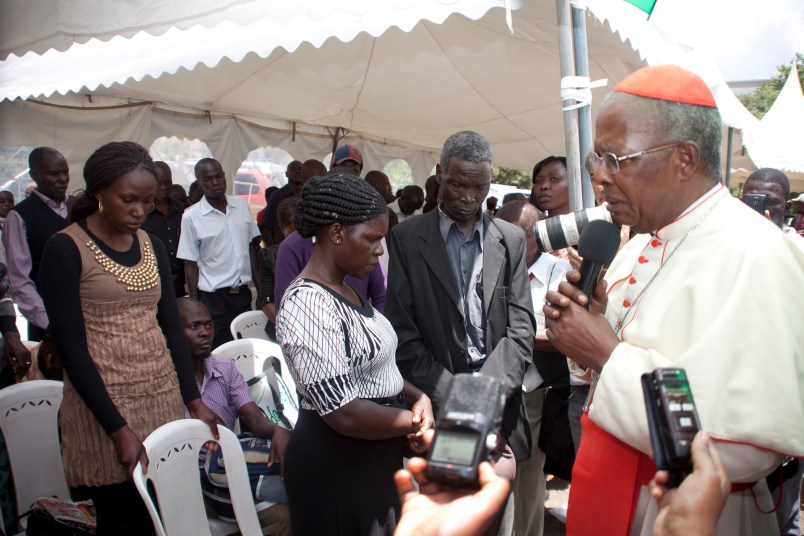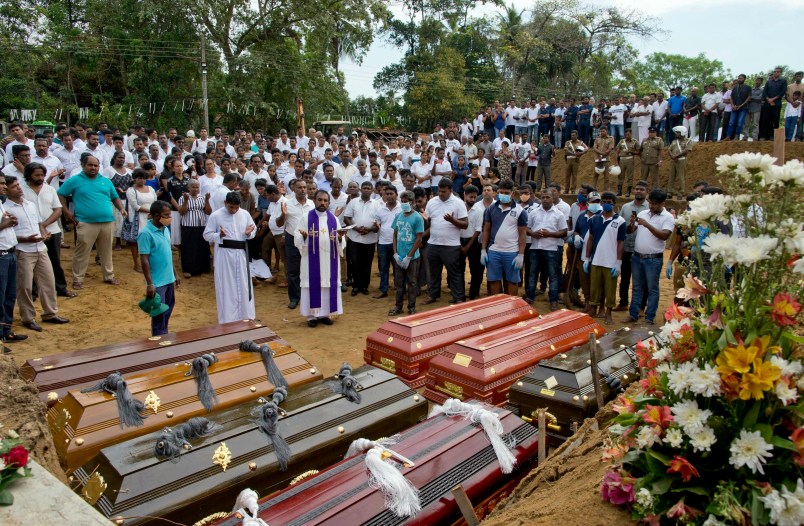NAIROBI, Kenya (AP) — Some relatives of students who were mercilessly gunned down by Islamic militants said Wednesday they would pray for forgiveness for the killers, responding to a Catholic archbishop who visited a morgue where victims’ bodies are being kept.
Cardinal John Njue, the archbishop of Nairobi, prayed with some of the families with a son or daughter, nephew or niece who died in the April 2 assault on Garissa University College by al-Shabab, the extremist group based in neighboring Somalia. Four gunmen killed 148 people and then also died when Kenyan security forces regained control of the campus later in the day.
“You should pray for your enemies, so that they can change,” said Teresa Kiiru, whose cousin, 22-year-old Obeddy Oking, died in the attack. “As Christians, we are told to forgive those who sin against us.”
Many family members have described, sometimes bitterly, the death of a child in the Garissa slaughter as not just an emotional blow, but also the loss of an “investment” into which they had poured money and hopes. Making it to university is a big achievement in Kenya, where many people don’t get opportunities that open the way to a financially secure life.
Some home villages of the dead students, seen as bright stars who were making their communities proud, are reportedly experiencing collective grief. On Wednesday, the morgue began releasing bodies to grieving families, who prepared to take the coffins on long bus journeys for burial at home.
“Take courage and do not give up,” Njue told relatives sitting under a tent at Nairobi’s Chiromo Funeral Parlour. “These are the challenges that come in our lives. Some of them are most probably too heavy … heavier than we can be able to bear, humanly speaking. But let us try what we can.”
The cardinal said he hoped the Garissa attack would become a “moment of re-examination” of ways to improve security for Kenyans following numerous allegations that the government response was slow and initially ineffective. He appealed for a “process of compassion” for the perpetrators, despite their terrible deed.
“We pray then for all those who are concerned with this,” he said. “We are not dealing with animals, we are dealing with human beings … If this were to happen to them, I don’t think any of them would ever be joyful.”
The message resonated with Evelyn Wakholi, whose 18-year-old daughter, Milly Yonbo, died in the attack.
“The Bible says: ‘Do not judge,'” Wakholi said. “It’s painful, but what can we do?”
Then she wondered aloud why the killers, one of whom has been identified as the son of a Kenyan government official, had to kill young people rather than the elderly. Youths, Wakholi declared, could withstand the suffering, and unlike their elders, have yet to experience the fullness of life.
Milly’s aunt, Josephine Shiyuka, said her Christian faith dictated forgiveness for the killers, noting Jesus Christ forgave those who crucified him. Those who helped the gunmen might still turn back from their violent creed, she said.
“If they’re living, they still have time to change,” she said.
Al-Shabab, however, has warned of more attacks after the Garissa bloodshed. It said “Kenyan cities will run red with blood,” according to the SITE intelligence monitoring group.
Kenyan President Uhuru Kenyatta vowed a sharp response to last week’s attack. Kenyan warplanes attacked suspected militant positions in Somalia, and the government said Wednesday that it was freezing accounts of organizations and individuals suspected of financing Islamic extremists.
The freeze applies to 85 companies and individuals identified because of suspicious transactions, said senior treasury official Kamau Thugge. The list includes organizations dealing in remittances to Somalia.
After praying with families at the morgue, the cardinal said in an interview with The Associated Press that parents of the dead were going through a “very, very trying time” and that what the attackers did was “really horrible,” but he held out hope that militants would repent.
“Let us pray for them, that they may come to a point of undergoing a metamorphosis” in which they realize “they are dealing with life,” Njue said.
However the bereaved father of Oking, the 22-year-old student who died in Garissa, said he did not have such hope.
“I don’t have any compassion for the terrorists, because I took my child to school. Today, I am taking him dead,” said the father, John Wanyonyi Okodoi.
“I had invested a lot in that child; from childhood, high school to university,” he said. “Even his brothers — I dropped them for the sake of this child because he performed so well. I asked the family, ‘Let him go so he would come and help us.’ Today we are completely desperate. We have no future. We are only being given hope, but the gateway to see that hope is bleak.”
___
AP writer Tom Odula contributed to this report from Nairobi.
Copyright 2015 The Associated Press. All rights reserved. This material may not be published, broadcast, rewritten or redistributed.






